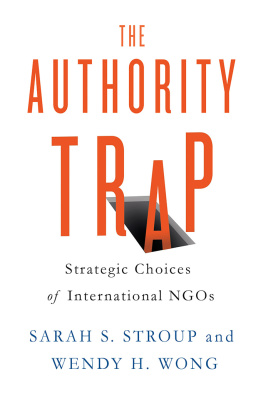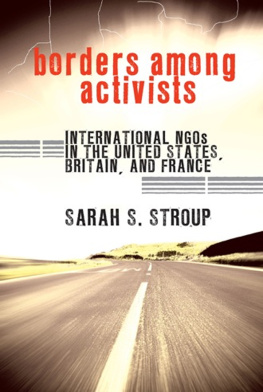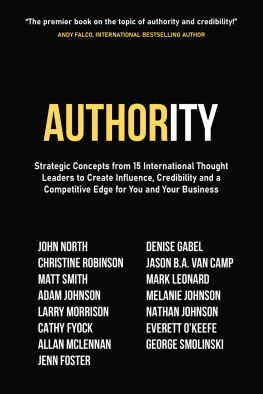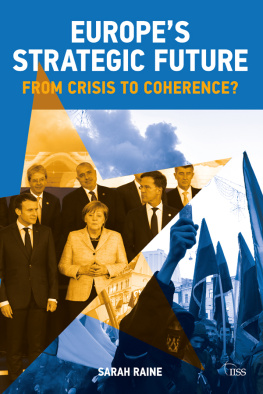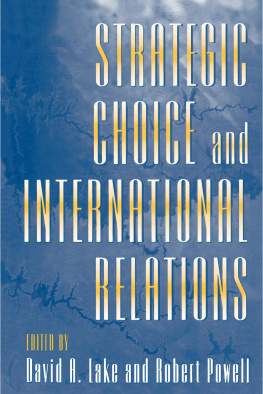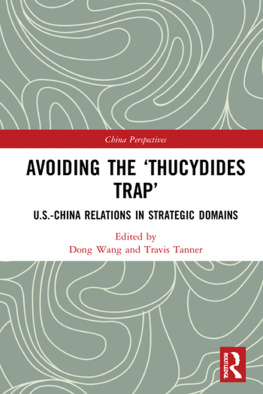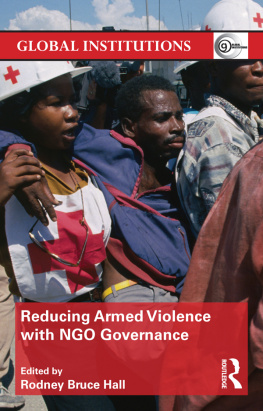Sarah S. Stroup - The Authority Trap: Strategic Choices of International NGOs
Here you can read online Sarah S. Stroup - The Authority Trap: Strategic Choices of International NGOs full text of the book (entire story) in english for free. Download pdf and epub, get meaning, cover and reviews about this ebook. year: 2017, publisher: Cornell University Press, genre: Politics. Description of the work, (preface) as well as reviews are available. Best literature library LitArk.com created for fans of good reading and offers a wide selection of genres:
Romance novel
Science fiction
Adventure
Detective
Science
History
Home and family
Prose
Art
Politics
Computer
Non-fiction
Religion
Business
Children
Humor
Choose a favorite category and find really read worthwhile books. Enjoy immersion in the world of imagination, feel the emotions of the characters or learn something new for yourself, make an fascinating discovery.
- Book:The Authority Trap: Strategic Choices of International NGOs
- Author:
- Publisher:Cornell University Press
- Genre:
- Year:2017
- Rating:3 / 5
- Favourites:Add to favourites
- Your mark:
- 60
- 1
- 2
- 3
- 4
- 5
The Authority Trap: Strategic Choices of International NGOs: summary, description and annotation
We offer to read an annotation, description, summary or preface (depends on what the author of the book "The Authority Trap: Strategic Choices of International NGOs" wrote himself). If you haven't found the necessary information about the book — write in the comments, we will try to find it.
Sarah S. Stroup: author's other books
Who wrote The Authority Trap: Strategic Choices of International NGOs? Find out the surname, the name of the author of the book and a list of all author's works by series.
The Authority Trap: Strategic Choices of International NGOs — read online for free the complete book (whole text) full work
Below is the text of the book, divided by pages. System saving the place of the last page read, allows you to conveniently read the book "The Authority Trap: Strategic Choices of International NGOs" online for free, without having to search again every time where you left off. Put a bookmark, and you can go to the page where you finished reading at any time.
Font size:
Interval:
Bookmark:
| AC | INGO Accountability Charter |
| AI | Amnesty International |
| ATT | Arms Trade Treaty |
| ATTAC | Association pour la Taxation des Transactions financires et pour lAction Citoyenne |
| BRAC | Bangladesh Rural Advancement Committee |
| CAC | Control Arms Campaign |
| CAFOD | Catholic Agency for Overseas Development |
| CARE | Cooperative for Assistance and Relief Everywhere |
| CICC | Coalition for an International Criminal Court |
| COP | Conference of the Parties [to the UN Framework Convention on Climate Change] |
| CRS | Catholic Relief Services |
| DFID | Department for International Development [United Kingdom] |
| ECOSOC | [United Nations] Economic and Social Council |
| EDF | Environmental Defense Fund |
| EU | European Union |
| FIDH | Fdration internationale des ligues des droits de lHomme |
| FoE | Friends of the Earth |
| FSC | Forest Stewardship Council |
| FTT | financial transactions tax |
| G20 | Group of 20 |
| GRI | Global Reporting Initiative |
| HRW | Human Rights Watch |
| IANGO | International Advocacy NGO |
| IANSA | International Action Network on Small Arms |
| IATI | International Aid Transparency Initiative |
| ICBL | International Campaign to Ban Landmines |
| ICC | International Criminal Court |
| ICJ | International Commission of Jurists |
| ICRC | International Committee of the Red Cross |
| ICSC | International Civil Society Center |
| IGO | intergovernmental organization |
| IIED | International Institute for Environment and Development |
| IMF | International Monetary Fund |
| INGO | international nongovernmental organization |
| KPI |
Font size:
Interval:
Bookmark:
Similar books «The Authority Trap: Strategic Choices of International NGOs»
Look at similar books to The Authority Trap: Strategic Choices of International NGOs. We have selected literature similar in name and meaning in the hope of providing readers with more options to find new, interesting, not yet read works.
Discussion, reviews of the book The Authority Trap: Strategic Choices of International NGOs and just readers' own opinions. Leave your comments, write what you think about the work, its meaning or the main characters. Specify what exactly you liked and what you didn't like, and why you think so.

